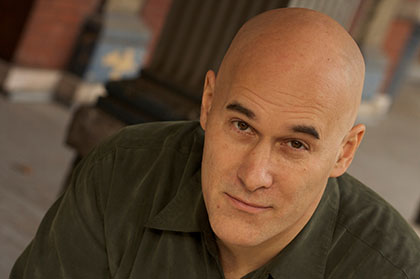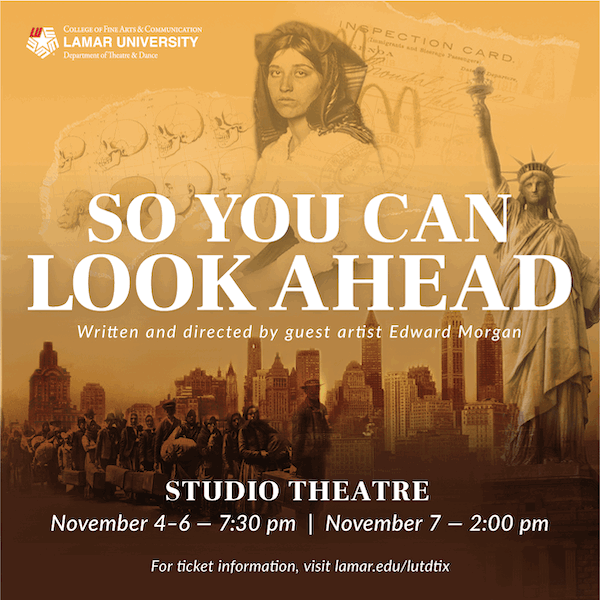Director's Note with Edward Morgan
The Lamar University Department of Theatre and Dance is thrilled to bring the world premiere of “So You Can  Look Ahead” to the Cardinal stage. Written and directed by internationally recognized guest artist, Edward Morgan, “So You Can Look Ahead” has had readings in London, Berlin, Baltimore and New York City and has received multiple awards including Semi-Finalist, National Playwrights Conference, Eugene O'Neill Theatre Center, CT (2019), Winner, HRC Showcase Theatre's W Keith Hendrick Playwriting Contest, 2017, Semi-Finalist, Blue Ink Playwriting Contest 2018, American Blues Theatre, Chicago, and Semi-Finalist, The Road Theatre Playwright's Festival 2017, Hollywood, CA.
Look Ahead” to the Cardinal stage. Written and directed by internationally recognized guest artist, Edward Morgan, “So You Can Look Ahead” has had readings in London, Berlin, Baltimore and New York City and has received multiple awards including Semi-Finalist, National Playwrights Conference, Eugene O'Neill Theatre Center, CT (2019), Winner, HRC Showcase Theatre's W Keith Hendrick Playwriting Contest, 2017, Semi-Finalist, Blue Ink Playwriting Contest 2018, American Blues Theatre, Chicago, and Semi-Finalist, The Road Theatre Playwright's Festival 2017, Hollywood, CA.
Who better to help us understand the story and process than the writer, director himself? We are honored to speak with Edward and get an inside look into the process for “So You Can Look Ahead.”
Edward, What can a person expect from So You Can Look Ahead? The play has been described as "a little-known chapter of American history that resonates today' even though it’s set in 1932. Can you explain this a little more?
This story centers around five people in New York City in 1932. That’s a different time and place from ours but they’re people that are not so different from us, and the things they’re dealing with definitely relate to things we’re dealing with in America today. In fact, the events of that era still have some influence on America today. So, the reason I wrote the play is because it does resonate with the present. Hopefully though, it will also just be engaging as a story and entertaining theatrically.
As the writer and director, what has been the most challenging aspect(s) of this process for you?
The most challenging aspect of directing this play is getting free from the writing vision of it – like, how I’ve seen things in my head – and applying my directorial skills to make it work best in this situation. Directing is partly architecture (having a vision) and partly like carpentry (making adjustments to the circumstances and reworking things so they fit and function best). That’s harder to do when you’re not “seeing it fresh” or from the outside. As a playwright, the most challenging thing is always how to keep hearing the script objectively, so you can make improvements. And then, once you’re in rehearsal, you can really only make small improvements, because the actors are already the versions that they have.
With this being your 1st production as a guest director with Lamar University, how has this process differed from those of the past beyond the work itself?
Every situation is unique, at a university or a professional theatre, so there are always adjustments one has to make as a guest artist. Overall, I’ve been pleased with the program at Lamar U. and found it pretty easy to adapt to the way things are done here. It’s been a very productive process.
What were the key elements in transcribing this work to the Lamar University students?
I made very few changes in the text to stage the play here, aside from adjusting a few of the character’s ages a little. The larger change was to add an ensemble of 5 actors who help fill out the story in various scenes and also help with the scene shifts. They’ve really become a large part of the experience of the play and I think they’re contributing a lot. The script was written for a cast of 5 but we have a cast of 10. I like it this way!
Edward, thank you for taking the time to speak with us and get a closer look behind the curtain. The last word is yours. Anything you want to say to interested parties, the cast and crew, the Lamar community, etc...?
The first production of a play is really special. First of all, in this case, it’s been some years in coming. I began this play about 7 years ago. I finished the first draft maybe 5 years ago, and since then it’s had two staged readings and one online reading and each one has helped me to do some rewrites. But they don’t begin to compare with a having a full production. Until a play has been fully staged, it just doesn’t feel like it’s had a chance to live. So, I’m extremely grateful to the faculty and students here at Lamar University for helping me finally make this play a reality. On top of that it’s exciting for all of us to be inventing how this play is done, how it’s staged and how things unfold moment to moment. We’re setting the pattern. Even though later productions may change that pattern in various ways, the first production will always be there to refer back to. Likewise, the audience for this show will be the first real audience, and that will teach me a great deal about the play. I’m excited about the work we’ve done and excited to see it born.
“So You Can Look Ahead” runs November 4 – 6 at 7:30 p.m. and November 7 at 2:00 p.m. in the Lamar University Studio Theatre. Tickets may be purchased by going to lamar.edu/lutdtix. Prices range from $7 - $15 and may also be purchased at the door if seating allows.


